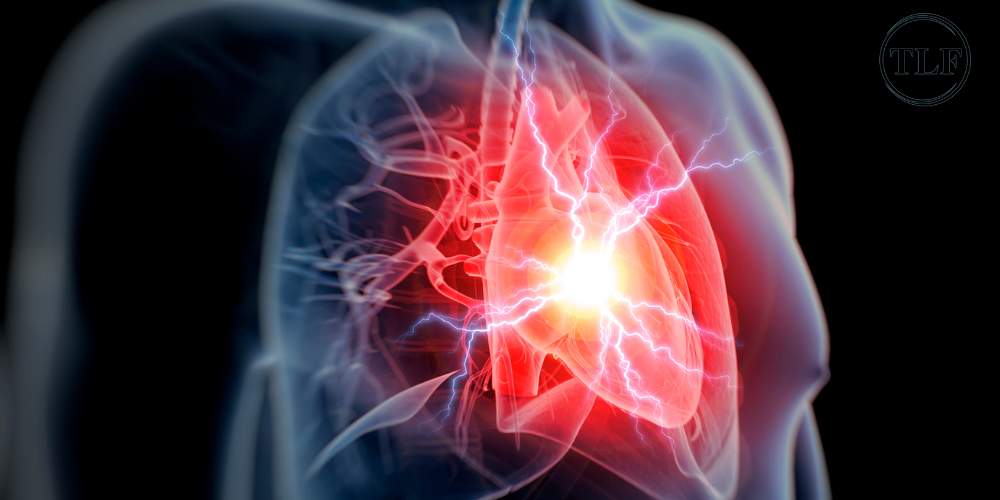Putting Our Knowledge And Experience To Work
Home » Medical Malpractice » Failure to Diagnose Heart Attack
Failure to Diagnose Heart Attack Attorney
Ohio and Northern Kentucky Medical Malpractice Lawyers for Failure to Diagnose Heart Attacks
At TLF: The Medical Injury Law Firm, our dedicated team of Ohio and Northern Kentucky medical malpractice lawyers specializes in advocating for those who have suffered due to a failure to diagnose heart attacks.
Recognizing the critical impact of timely and accurate diagnosis on patient outcomes, our experienced attorneys are committed to holding negligent medical professionals liable for their oversights. If you or a loved one suffered the adverse effects of a heart attack misdiagnosis, contact TLF: The Medical Injury Law Firm at (800) 698-4054 to schedule a consultation with a compassionate Ohio or Northern Kentucky medical malpractice attorney today.

What is a Heart Attack?
A heart attack, formally known as a myocardial infarction, occurs when a part of the heart muscle receives significantly less or no oxygenated blood. This usually stems from the accumulation of plaque in the coronary arteries, creating blood clots that impede blood circulation. If blood flow isn’t promptly reestablished, the deprived heart tissue dies from oxygen starvation, harming the cardiac muscle.
Heart attacks are critical medical emergencies that require immediate attention, as the severity of the damage can vary and may lead to serious injury and life-threatening complications if not promptly and effectively treated.
If a doctor failed to diagnose your heart attack, you could pursue a medical malpractice claim. At TLF: The Medical Injury Law Firm, our attorneys have represented countless medical malpractice cases involving failure to diagnose a heart attack. To discuss your case with a knowledgeable medical negligence attorney, contact TLF today.
What Causes a Heart Attack?
The main cause of a heart attack is coronary artery disease (CAD), a condition characterized by the accumulation of plaque—a mix of fat, cholesterol, calcium, and other substances—in the coronary arteries that supply blood to the heart.
Over time, plaque can harden and tighten the arteries, known as atherosclerosis. When a plaque ruptures, it can form a blood clot on its surface, completely blocking oxygen-rich blood from parts of the heart muscle leading to a heart attack.
Other contributing factors may include severe spasms of a coronary artery, which can temporarily constrict blood flow, or conditions that demand an unusually high level of oxygen by the heart muscle, exceeding the available supply.

Common Heart Attack Symptoms
Heart attacks manifest through various signs that often include chest pain or discomfort, described as a sensation of pressure, tightness, or squeezing in the chest area. Other common symptoms can encompass shortness of breath, nausea, lightheadedness, or discomfort in upper body areas like arms, neck, jaw, or back.
Symptoms can vary among individuals, and in some cases, heart attacks may occur without any obvious symptoms, particularly in women and older adults. Recognizing these symptoms early and seeking prompt medical treatment is crucial for reducing the risk of severe complications or death.
If a medical professional fails to diagnose a heart attack, you could file a medical malpractice case against the responsible party. Contact TLF: The Medical Injury Law Firm today to learn more about filing a claim.
Chest Pain or Discomfort
Chest pain or discomfort is the most recognized and commonly experienced heart attack symptom. This sensation is often described as pressure, tightness, fullness, or a squeezing pain in the center or left side of the chest. This discomfort may last several minutes, disappear, and then return, varying in intensity. It’s crucial to understand that chest pain associated with a heart attack can differ greatly from person to person; for some, it may be mild and mistaken for indigestion, while for others, it may be severe and debilitating.
Shortness of Breath
Dyspnea, or shortness of breath, can occur with or without chest discomfort during a heart attack. It may present as an uncomfortable sensation of being unable to breathe deeply, feeling winded, or struggling to breathe even at rest.
This symptom can arise suddenly or develop gradually over time, signaling the heart’s inability to pump blood effectively due to compromised cardiac function. Shortness of breath is a critical sign that the body is not receiving adequate oxygen.

Upper Body Pain
Upper body pain or discomfort is a notable symptom of a heart attack that can manifest in areas other than the chest. This pain can extend to one or both arms, the back, shoulders, neck, jaw, or upper part of the stomach.
Unlike typical muscle pain, this discomfort is often described as a dull ache, a feeling of pressure, or a squeezing sensation that may come and go or persist continuously. It’s important to recognize that upper body pain related to a heart attack might not be accompanied by chest pain, especially in women.
Nausea or Vomiting
Nausea or vomiting can be less common but significant symptoms of a heart attack, particularly in women. These symptoms may occur independently or alongside the more classic signs of a heart attack, such as chest pain and shortness of breath. Nausea or vomiting during a heart attack can be caused by extreme stress on the body or may be a direct result of the heart’s compromised ability to pump blood effectively, leading to an upset stomach. It’s crucial to recognize that when other heart attack signs accompany these gastrointestinal symptoms, they should not be dismissed as digestive issues.
Lightheadedness or Dizziness
Lightheadedness or dizziness during a heart attack can occur when the heart cannot pump blood efficiently to the brain and other organs. This symptom may manifest as a sudden feeling of faintness, wooziness, or a spinning sensation, sometimes accompanied by nausea or sweating. It’s particularly concerning when combined with chest discomfort or shortness of breath, as it may indicate a significant drop in blood pressure.
Cold Sweat
Cold sweats during a heart attack are often a response to the stress the body experiences as it struggles with the reduced blood flow to the heart. When combined with symptoms like chest pain or shortness of breath, a cold sweat can be a critical warning sign, indicating the need for immediate medical attention to address a potential heart attack and prevent further cardiac damage.
Fatigue
Fatigue, particularly when it is severe and unexplained, can be a subtle but significant symptom of a heart attack, especially in women. This type of fatigue isn’t simply feeling tired after a long day; it’s an overwhelming sense of exhaustion that doesn’t improve with rest. It may come on suddenly or build up over days, and can be present even during periods of inactivity. When the heart is not pumping efficiently due to a blockage or damage, the body may not receive enough oxygen-rich blood, leading to feelings of weariness and lack of energy.

The Importance of Early Heart Attack Detection
Early detection of heart attacks is crucial for several reasons. Primarily, it significantly improves the chances of survival and minimizes the extent of heart damage. When a heart attack is identified promptly, treatments such as clot-busting drugs, balloon angioplasty, and stent placement can be administered in the critical early hours, restoring blood flow to the heart and preventing extensive heart muscle death.
When heart attacks are diagnosed quickly, they also allow for faster implementation of lifestyle changes and medical interventions to prevent future heart attacks, thereby improving long-term health outcomes. Moreover, it reduces the likelihood of complications such as heart failure, arrhythmias, or even sudden cardiac death, which are more common when treatment is delayed.
What Happens When a Doctor Fails to Diagnose a Heart Attack?
When a doctor fails to recognize risk factors and diagnose a heart attack, the consequences can be severe and life-threatening. Without timely diagnosis and treatment, the heart muscle may remain deprived of oxygen, leading to increased damage or necrosis of the heart tissue. This can significantly impair the heart’s ability to pump blood effectively, potentially leading to heart failure, arrhythmias, or cardiogenic shock.
Failure to diagnose heart disease or an attack can increase the risk of a subsequent, potentially more fatal heart attack. From a legal and ethical standpoint, failure to diagnose could also lead to medical malpractice claims, as patients depend on healthcare professionals for accurate and prompt diagnosis to initiate life-saving treatments.

When Medical Negligence Leads To Further Injury or Death
When medical negligence results in further injury or death, it represents a profound breach of trust between healthcare providers and patients, leading to devastating consequences. The physical impact can range from exacerbated existing conditions to new, irreversible injuries or even wrongful death, profoundly affecting the patient’s quality of life and the well-being of their families.
Beyond the immediate health implications, such negligence can inflict significant emotional trauma and financial strain on the victims and their loved ones as they grapple with unexpected medical costs, loss of income, and the emotional toll of grief or long-term care.
These instances can lead to complex medical malpractice lawsuits as patients or their families seek accountability and compensation for the harm suffered. The ripple effects of medical negligence underscore the critical importance of adherence to high standards of care within the healthcare system to prevent avoidable harm.

Your Legal Rights and Compensation
If you’ve suffered harm due to a medical professional’s failure to recognize heart attack symptoms, you may be entitled to damages stemming from a medical malpractice case. It’s important to consult with a professional at a personal injury law firm specializing in medical malpractice cases. Knowledgeable personal injury attorneys can offer guidance tailored to the specifics of your situation, help navigate the complexities of legal proceedings, and advocate for you to ensure your rights are protected.
How the Attorneys at TLF: The Medical Injury Law Firm Can Help
At TLF: The Medical Injury Law Firm, we specialize in navigating the complexities of medical malpractice and negligence cases, providing invaluable support to individuals who have suffered injuries caused by avoidable medical errors.
Our Northern Kentucky medical malpractice attorneys can offer comprehensive legal representation, ensuring clients are fully informed of their legal rights and options. Our knowledge and experience handling misdiagnosis cases allows us to investigate and gather evidence, consult with medical experts to substantiate claims, and aggressively advocate for our clients’ interests in negotiations or court.

Call the Ohio and Northern Kentucky Medical Malpractice Attorneys at TLF For a Free Consultation
If you or a loved one has been impacted by medical malpractice in Ohio or Northern Kentucky, the dedicated attorneys at TLF: The Medical Injury Law Firm are here to help. You can reach our Covington law office at (859) 898-2472, our Cincinnati law office at (513) 643-1689, or toll-free at (800) 698-4054. You may also fill out our online form to schedule a free consultation with us regarding your case. Our team will listen to your case, evaluate your situation, and guide you through your legal options with clarity and empathy.
Let TLF stand by your side in seeking the justice and compensation you are entitled to. Don’t navigate this challenging time alone; reach out to the Ohio and Northern Kentucky medical malpractice attorneys at TLF today.
Practice Areas
You Pay No Fees Unless We Win!
We are happy to offer a free consultation to evaluate your case. If you hire us as your legal counsel, we will represent you on a contingency-fee basis. You will pay no attorneys’ fees unless we recover financial damages.
